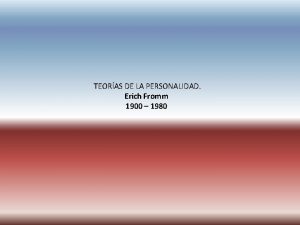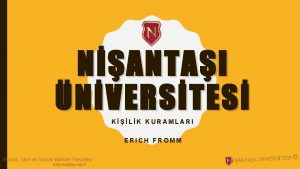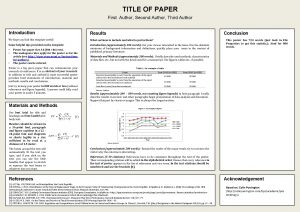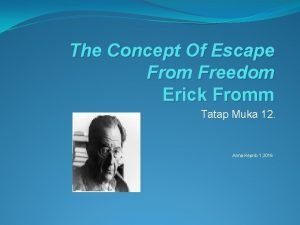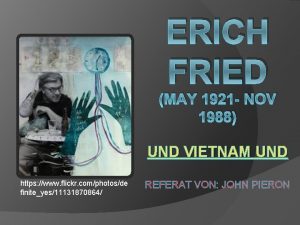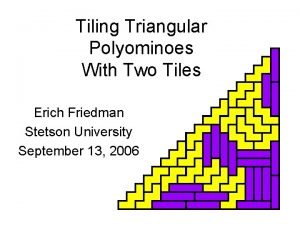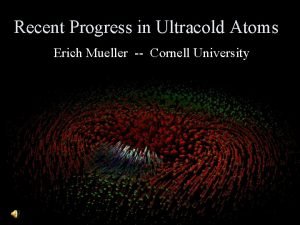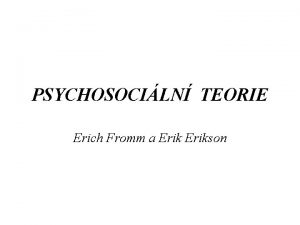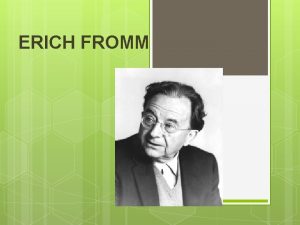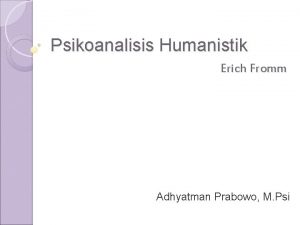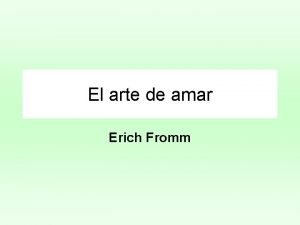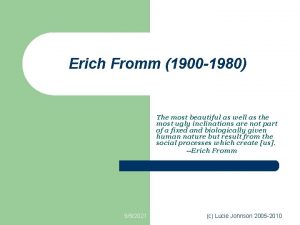Erich Fromm the author of unit 8 team
















- Slides: 16

Erich Fromm ----the author of unit 8 team members: 汤卉、付立英、李央、 熊莉、蒋辉

Contents: • • Background imformation of this text Erich Fromm’s life experience His psychological theory Main works

Background Information About this text: this text is an excerpt from The Sane Society by Erich Fromm, in which Fromm is mainly concerned with the impact of industrialization on Americans and alienation between the worker and his products along by this social transformation.

life Experience • Erich Fromm (March 23, 1900 – March 18, 1980) was a German-American Jewish social psychologist, psychoanalyst, humanistic philosopher, and democratic socialist. He was associated with what became known as the Frankfurt School of critical theory. • His father was a business man, rather moody. His mother was frequently depressed. In other words, his childhood wasn't very happy. • A founder of psychoanalysis sociology.


• In 1918, he started his academic studies in the University of Frankfurt with jurisprudence. • he received his Ph. D from Heidelberg in 1922 and began a career as a psychotherapist. • He moved to the U. S. in 1934. • In 1943, Fromm helped form the New York branch of the Washington School of Psychiatry. .

• In 1949, Fromm moved to Mexico and became a professor at the National Autonomous University of Mexico (UNAM). • From 1957 to 1961, he taught as a professor of psychology at Michigan State University. • From 1962 on, he worked as an adjunct professor of psychology at New York University. • In 1974, he moved to Muralto. • He died in 1980 in Switzerland.

psychological theory As a psychoanalyst, he applied psychoanalysis to social, political, religious, moral activities. he was perticularly interested in the study of individual and society. He paid much attenion to self human realization. Fromm's theory is a rather unique blend of Freud and Marx. Freud emphasized the unconscious, biological drives, while Marx saw people as determined by their society. In fact, Fromm makes freedom the central characteristic of human nature.

Fromm believed that embracing freedom of will was healthy, while escaping freedom was the root of psychological conflicts. The cornerstone of Fromm's humanistic philosophy is his interpretation of the biblical story of Adam and Eve's exile from the Garden of Eden. Fromm extolled the virtues of humans taking independent action and using reason to establish moral values rather than adhering to authoritarian.

According to Fromm, the awareness of a disunited human existence is a source of guilt and shame His theory is fairly unique to him: No one before or since has put it so directly: Your personality is to a considerable extent a reflection of such issues as social class, minority status, education, vocation, religious and philosophical background, and so forth. A very under-represented view which has an increasing influence on biological theories.

Escape from Freedom was his first pioneering work of 1941. His second important work, Man for Himself , an inquiry into the Psychology of Ethics , continued and outlined Fromm's theory of human character.

Political ideas and activities: • Fromm's most well-known work, Escape from Freedom, focuses on the human urge to seek a source of authority and control upon reaching a freedom that was thought to be an individual’s true desire. • The culmination of Fromm's social and political philosophy was his book The Sane Society, published in 1955, which argued in favor of a humanistic and democratic socialism. • Fromm was also active in US politics. He joined the Socialist Party of America in the mid-1950 s

works Escape from Freedom (1941) Man for Himself (1947) Psychoanalysis and Religion (1950) The Sane Society (1955) The Art of Loving (1956) Socialist Humanism (1965) The Nature of Man (1968)

• Escape from Freedom (The Fear of Freedom ) explores over a few short chapters humanity's shifting relationship with freedom, with particular regard to the personal consequences of its absence. Its special emphasis is the psychosocial conditions that facilitated the rise of Nazism. People could separate from autonomous beings and direct their own future rather than simply fulfilling a socioeconomic role.

• The Art of Loving, was an international best seller. It read more like a religious work than psychology. Fromm considered love to be an interpersonal creative capacity rather than an emotion. he believed the common elements of love are responsibility, knowledge, care, and respect. Love can’t be indulged in at will and has nothing to do with the degree of maturity.

 Personalidad erich fromm
Personalidad erich fromm Erich fromm haben oder sein
Erich fromm haben oder sein Arti cinta kasih
Arti cinta kasih Erich fromm varoluşsal ihtiyaçlar
Erich fromm varoluşsal ihtiyaçlar First author second author third author
First author second author third author Erick fromm
Erick fromm Fromm engineering
Fromm engineering Erich maria remargue
Erich maria remargue Erich fried biographie
Erich fried biographie Erich gamma
Erich gamma Erich friedman
Erich friedman Erich mueller cornell
Erich mueller cornell Remarque současníci
Remarque současníci Erich fried gebranntes kind
Erich fried gebranntes kind Erich strohmaier
Erich strohmaier Erich maria remarque kramer
Erich maria remarque kramer Erich gamma
Erich gamma
